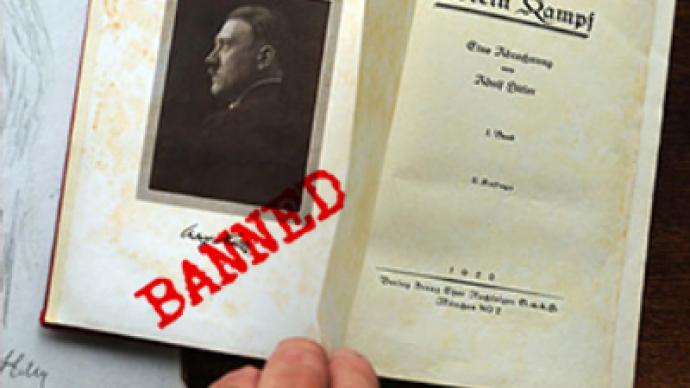Hitler’s book banned as extremist

Adolf Hitler’s book “Mein Kampf” (My Struggle) has been recognized as extremist literature by a Russian court and will be banned in Russia, the Prosecutor General’s Office says.
The decision was made by a court of the city of Ufa, the capital of Russia’s Republic of Bashkortostan.
The autobiographical book “sets out ideas of national-socialism, conveys a militaristic world-view, excuses discrimination and the eradication of non-Aryan people, and reflects ideas which resulted in the start of the World War II,” the statement on the Prosecutor General’s website reads.
So far, Adolf Hitler’s book has been available for downloading on a number of Russian websites and could be found in some “underground” book stores throughout the country.
However, after the court ruling comes into force, “Mein Kampf” will be included into the Federal List of Extremist Literature, which means it will be prohibited to distribute the Nazi leader’s fundamentalist book. The list now includes 574 items: articles, books, brochures, and magazines. Among them, for instance, is a movie called “Eternal Jew”, brochure “Who is afraid of Russian national-socialism” and “Jewish-Christian plague”.
The Ufa court’s decision was based on the Federal Law on Combating Extremist Activity, which was adopted in 2006. According to the law, “works of leaders of National-Socialist Germany” are considered extremist. Distribution of such materials, along with their storage or production with the purpose of further distribution are prohibited on the territory of the Russian Federation.
“Mein Kampf”, regarded the Nazi Bible, was first published in 1925 in Germany and banned after WWII. Its Russian edition, however, has been available to the public since 1992 which has been fiercely criticized by human rights activists. Among the reasons for that was not only the moral factor: the Soviet Union suffered tremendous losses – over 25 million lives – in the bloodiest war in history. The main concern has been the rise of extremist moods among the public, especially youngsters.
Extremism, xenophobia, nationalism and racism – these words can often be heard in Russian news programs, where reports on cases of hate crimes and racist violence have become frighteningly regular. The majority of those who fall victim to such crimes are migrants from Central Asia and the Caucasus who come to Russia seeking jobs and better living conditions. On several occasions, students from Latin American and African countries who do not look Slavic have been attacked by extremist groups.
Ahead of the 65th anniversary of the victory over the Nazi Germany, which will be celebrated on May 9, Russia seems to be more decisive than ever in trying to finally solve the problem. On the same day Hitler’s book was banned, Moscow’s Prosecutor, Yury Syomin, filed a case against the “Slavic Union” movement, Itar-Tass reports. The activity of the organization, founded in 1999, has been suspended and the case has been submitted to court.
According to the Prosecutor General’s office statement, the organization was promoting national-socialistic ideas similar to those of Nazi Germany.
“The ideas reflect the exceptionality and superiority of a person based on one’s nationality,” it reads.
Earlier, in an interview with Interfax agency, the head of the Slavic Union, Dmitry Dyomushkin, said that he had been summoned to the Prosecutor General’s Office.
"I was told during the conversation that all nationalist organizations existing in Russia will be shut down by the 65th anniversary of the victory," he said.
The government’s efforts to tackle the extremist problem seem to have already yielded positive results.
According to SOVA Center for Information and Analysis – a human rights non-governmental organization – “2009 was the first year in more than six years of our observations when the number of incidents of racist and neo-Nazi violence decreased significantly, even though it remains frighteningly high.”
“To some extent, credit should go to the law enforcement agencies, who suppressed the largest and most aggressive ultra-right groups in the Moscow region in the second half of 2008 and in 2009,” a report by Galina Kozhenvikova published on the organization’s webpage reads. “However, despite all efforts, xenophobic violence remains alarming in its scope and extends over most of the Russian regions, affecting hundreds of people.”
Natalia Makarova, RT












